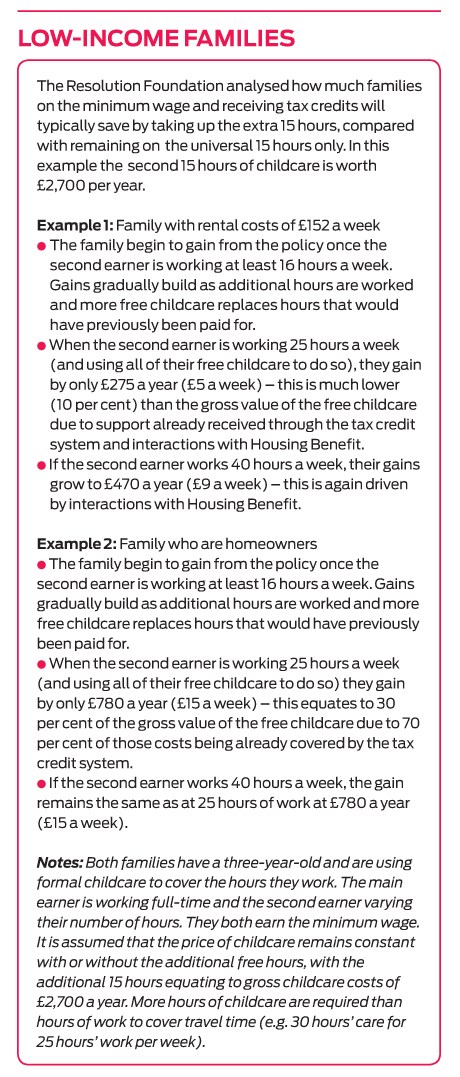Nursery Management: 30 Hours: Exclusive - A golden ticket?
Katy Morton and Hannah Crown
Tuesday, September 19, 2017
We know the 30 hours represents a significant saving for some parents, but is this the case for all? Katy Morton and Hannah Crown report

The Government’s 30 hours policy will save some of the poorest households £5 per week, while the richest will gain ten times that, exclusive analysis has found.
Despite the Government saying the 30 hours of ‘free’ childcare saves up to 390,000 families around £5,000 per year per child, analysis commissioned by Nursery World from the Resolution Foundation shows that the maximum gains are only made by higher earners. Parents can earn up to £99,999 individually and qualify for the scheme.
David Finch, senior economic analyst at the Resolution Foundation, says that while all eligible parents will save under the 30 hours, ‘it is those higher-earning families with gross earnings of £40,000 to £50,000 that stand to benefit the most’.
The think-tank reveals that a minimum wage household, with one parent on full- and one on part-time hours, makes a real-terms gain of just £5 per week, or £275 a year, from the extra 15 hours (see box). It is nearly a tenth of the £2,500 the Government says the additional 15 hours could save parents annually (half the full £5,000 worth of 30 hours saving). Families working fewer hours will save even less.
The 30 hours offer, which is unsurprisingly very popular with parents, ‘is benefiting higher earners the most, because they use childcare for longer hours and they pay for it’, says Natalie Perera, executive director and head of research at Education Policy Institute (EPI). ‘In many cases, this policy provides a transfer of cost from those higher-earning families to the tax-payer. This is unlikely to support the Government’s own aims of improving social mobility – in fact this could worsen it if providers are forced to prioritise those who are eligible for the 30 hours or if they do not have enough funding to invest in quality for all children.’
Neil Leitch, chief executive of the Pre-school Learning Alliance, says it is ‘nonsensical’ that money is being spent on families with a household income of nearly £200,000, while ‘those at the lowest end of the income scale, including parents who volunteer or are in training, do not qualify’. He says, ‘We now have a situation where the better off you are, the more you benefit. We’re in danger of embedding inequality into the heart of childcare policy.’
Low-income renters also receive less from 30 hours than home-owners, according to Resolution. The £5 per week saving made by a family with one full- and one part-time earner on the minimum wage is a third of the £15 made by a homeowner family in the same position (see box). This saving is what the family would otherwise pay for the extra 15 hours while receiving the universal 15 hours and available benefits such as tax credits. Tax credits are due to be replaced by Universal Credit, but even then, the think-tank says, 75 per cent of the gains made under 30 hours would go to the richest half of all households.
Many nurseries will be bringing in additional charges on top of the 30 hours in order to make ends meet. A survey by the National Day Nurseries Association found that 60 per cent intend to charge for consumables such as nappies and food. Fortunately for parents, the think-tank says it is likely to take substantial additional costs or fee rises – greater than the £2,500 the extended entitlement hours are potentially worth – to completely wipe out the gains made from the 30 hours, given that tax credits can be used to help cover the extra costs.
Labour MP Lucy Powell, who has criticised the Government for ‘skewing’ money away from the most disadvantaged with this policy, tells Nursery World: ‘These Resolution Foundation findings underline the concerns I’ve raised with ministers.It’s clear that higher-income families are the main beneficiaries. We need a rebalancing of childcare investment to make the gains in child development we desperately need and close the attainment gap.’
Her ‘Lost Generation’ report, published by the Social Market Foundation earlier this month, found that 75 per cent of the Government’s £9bn spend on childcare was going on the top half of households in terms of income, while the most disadvantaged received less than 3 per cent.
Ineligible
The worst-off parents, who work less than 16 hours per week on the national minimum wage, don’t qualify for the extended entitlement. More than one in ten (11 per cent) of all households meeting the working household criteria still do not earn enough to qualify, according to data company Ceeda. These parents could actually end up worse off as a result of the policy, as childcare programmes in at least two local authorities targeting the most disadvantaged children are being cut to pay for the 30 hours.
In Tower Hamlets, three-quarters of the borough’s 4,000 three- and four-year-olds are ineligible for the 30 hours because their parents’ income is too low. Before this month, 80 per cent of all disadvantaged Tower Hamlets children in this age bracket and those with SEN had full-time nursery places, but from this month the authority will reduce the proportion receiving the top-up to 60 per cent. This will go down to 40 per cent next September.
Pauline Hoare, the council’s lead officer for early years, says, ‘We’ve found money to fund it for two to three years, but there’ll come a time where there isn’t any more.’
In Hackney, 15 top-up hours which approximately 900 vulnerable three- and four-year-olds received will stop for the same reason, though some of these children will go on to receive the 30 hours.
Who is applying?
On average, parents claiming the 30 hours are likely to be well-educated and relatively rich. According to the first 30 hours evaluation, 34 per cent of families earned between £32k and £52k, and 32 per cent of families had a gross annual household income of more than £52k. Fifty-two per cent of parents had degrees. The median gross annual income is £35,204.
Just ten per cent of families taking up the offer were on annual incomes of below £15.6k, the equivalent of two parents working 20 hours on thenational living wage. Evaluation findings showed that couples with children were most likely to be taking up the 30 hours – and just 15 per cent were single parents.
As Nursery Managementwent to press, Government figures showed that 152,829 parents of three-year olds had successfully applied for a 30 hours place. This represents the 71 per cent of eligibility codes which have been validated to date, out of 216,384 issued.The DfE expects the numbers to grow as the year goes on as more three-year-olds turn four and new three-year-olds come through the system, with 200,000 expected for this first term. The 390,000 parents the DfE said would be eligible for the scheme represents a ‘peak figure over the year’. This is, however, significantly down from the original manifesto figure of 630,000.
Work
The policy is undoubtedly popular with parents. Writing in Nursery World earlier this month, Robert Goodwill, the new minister for children and families, said, ‘In Staffordshire, one parent who split her 30 hours between a pre-school and a childminder said it was the “greatest gift a working parent can be given” [and in the eight initial pilot areas] nearly a quarter of mums increased their working hours, as did nearly one in ten dads.’
One of the policy’s main goals is to make it ‘easier for these parents to work’, (Government wording). However, based on Mr Goodwill’s comment above, the policy has had no effect on the working hours of more than three-quarters of mums and the vast majority of dads.
On a positive note, extra childcare hours mean some parents are able to stay in a job, and make parents feel they are being rewarded for going to work – an effect that was particularly positively felt by those on lower incomes. Another finding of the early implementer evaluation was that the 30 hours benefited some shift workers as they were able to get more sleep during the day. It also found that parents were less reliant on informal childcare arrangements.
However, Mr Finch says it is questionable whether parents in the latter situation would actually work more. ‘Parents currently using informal childcare beyond the universal 15 hours may only slightly increase their working hours to around 20 hours a week as they will have to account for travel time and pay for childcare outside of the term-time only offer,’ he says.
Another aim of the extended entitlement is to support parents into work from unemployment, but this has proved to be more complex than anticipated. Restrictions on when places can be taken up could prove to be a barrier. Under the policy, parents with a job offer can apply for a place 12 weeks before they start employment, and take up a place two weeks before their employment commences. Depending on when this falls in the term, it could mean parents wait weeks before getting their funded place. For some this will mean paying for childcare and, for others who can’t afford it, sacrificing their job.
Mr Finch says this needs to be addressed so parents can take up a place instantly, as was the case in the pilot – during which just two per cent of mothers entered into employment.
While findings from early implementation showed families did make savings, in a lot of cases these were marginal and meant being able to afford additional treats. For more than half of parents it meant they had ‘slightly more to spend’. Just over a quarter (26 per cent) said they had ‘much more to spend’. For 16 per cent there was ‘no difference’.
Parents who benefited the most financially were those from middle- to high-income households, which the early implementation evaluation speculates could be because they tend to spend more on childcare.
Additionally, more vulnerable families often required more resources from local authority staff to take up the offer. According to the evaluation report, Hertfordshire County Council, which targeted the parents in receipt of the two-year-old entitlement, realised ‘it takes time to engage the most vulnerable parents and support them to find work, and this had not been fully appreciated when their approach was developed’. One local authority worker said, ‘I think we were probably a bit naïve about how quickly we would get people from one minute accessing free early education for two-year-olds and not having a job to, “Here you go, you’ve got a childcare place for 30 hours.”’
Children with SEND
The most vulnerable children could also lose out. In fact, according to children’s disabled charity Contact, children with special educational needs and disabilities (SEND) are more likely to miss out on a place as demand for places increases.
Some are being refused the 30 hours despite being eligible, the charity says.
Head of policy and public affairs Una Summerson explains, ‘Sadly, parents are being refused [the 30 hours] due to real or perceived funding issues. Providers are finding that the money given to deliver the extra 15 hours is not covering the cost of even the basic of provision. It means they are unable to fund extra support for those children that need it.
‘One parent was told by the local authority that it will not fund the additional 15 hours in a private nursery as the child already attends a specialist setting for the universal hours. The parent told us that she would prefer to use all the 30 hours entitlement in the specialist nursery as this is the most appropriate setting for her son, but has been told they do not have the capacity to support him.’
Pilot area Newham found a low take-up of funded hours from families whose children have SEND. ‘Perhaps because if you have children with additional needs, especially high needs, not many families have both parents working, so they would not be eligible,’ says early years strategic lead Nicola Blatchly-Lewis. There was a greater take-up among children with lower-level or emerging SEND.
A DfE spokesperson said, ‘We are spending over £2.5bn on 15 hours of free childcare for disadvantaged two-year-olds over five years. We know that the take-up of this offer is rising, with 71 per cent of disadvantaged two-year-olds accessing a place – an increase of 13 percentage points since 2015. The independent evaluation of pilot areas where nurseries were delivering the 30 hours offer showed that it did not have any significant adverse effects on the two-year-old offer.
We are also investing in the Early Years Pupil Premium, worth £300 per year for each eligible child, which supports better outcomes for disadvantaged children. The gap between disadvantaged children and others achieving a good level of development has narrowed from 19 percentage points in 2013 to 17.3 percentage points in 2015/16.’








